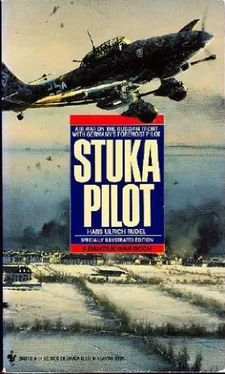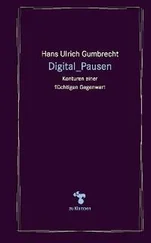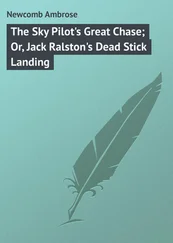An icy silence—until I break the intolerable pause:
“I am completely master of my aircraft.”
Almost contemptuously—or is it only my momentary impression?—he says with an emphasis that sends a shiver down my spine: “I will put your case before the C.O. and we’ll hope for the best. It’s for him to decide. That’s all; you can go and get yourself fixed up.”
As I come out of the tent into the blazing sunshine I blink my eyes—not only because of the glare. I am battling with a steadily growing feeling of desperation. Then common sense tells me there is no reason to give up hope: the adjutant may be prejudiced against me, but his opinion of me is one thing, the C.O.’s decision another. And even supposing the adjutant to have so much influence over the C.O.—could that be possible?
No, the C.O. is unlikely to be swayed because he does not even know me and will surely form an independent judgment. An order to report immediately to the C.O. puts an end to my brooding. I am confident that he will make up his mind for himself. I report. He returns my salute rather lackadaisically and submits me to a prolonged and silent scrutiny. Then he drawls: “We already know each other,” and, probably noticing an expression of contradiction on my face, waves aside my unuttered protest with a motion of his hand. “Of course we do, for my adjutant knows all about you. I know you so well that until further orders you are not to fly with my squadron. If at some future date we are under strength…”
I do not hear another word of what he says. For the first tune something comes over me, a feeling in the pit of my stomach: a feeling I never have again until years later when I am crawling home in an aircraft riddled by enemy bullets and serious loss of blood has sapped all my physical strength. This “something” is a dark intuition that despite everything the human factor is the criterion of war and the will of the individual the secret of victory.
How long the C.O. goes on talking I have not the least idea and as little of what he is saying. Rebellion seethes inside me and I feel the warning hammering in my head: “Don’t… don’t… don’t…” Then the adjutant’s voice recalls me to reality: “You are dismissed.”
I look at him now for the first time. I had not until that moment been aware that he was present. He returns me a stony stare. Now I have completely recovered control of my temper.
A few days later Operation Crete begins. The engines roar on the airfield; I sit in my tent. Crete is the trial of strength between the Stukas and the Navy. Crete is an island. According to all accepted military axioms only superior naval forces can wrest the island from the British. And England is a sea power; we are not. Certainly not where the Straits of Gibraltar prevent us from bringing up our naval units. The hitherto accepted military axioms, the English superiority at sea, are being wiped out by Stuka bombs. I sit in my tent “…that until further orders you are not to fly with my squadron!” A thousand times a day this sentence riles me, mocking, contemptuous, derisive. Outside I listen to the returning crews excitedly chatting of their experiences and of the effective landings of our airborne troops. Sometimes I try to persuade one of them to let me fly in his place. It is useless. Even friendly bribes avail me nothing. Occasionally I fancy I can read something like sympathy in the faces of my colleagues, and then my throat goes dry with bitter fury.
Whenever the aircraft take off on a sortie I feel like stuffing my fists into my ears so as not to hear the music of the engines. But I cannot. I have to listen. I cannot help myself! The Stukas go out on sortie after sortie. They are making history out there in the battle for Crete; I sit in my tent and weep with rage.
“We already know each other!” That is just what we do not. Not in the very least. I am positive that even now I should be a useful member of the squadron. I am completely master of my aircraft. I have the will to carry out an operation. A prejudice stands between me and the chance of winning my spurs. A prejudice on the part of my superiors who refuse to give me the opportunity to convince them of the wrongness of their “judgment.”
I mean to prove in spite of them that an injustice has been done me. I will not let their prejudice stop me getting at the enemy. This is no way to treat a subordinate; I realize that now. Time and again the flames of insubordination blaze inside me. Discipline! Discipline! Discipline! Control yourself, it is only by self-restraint that you can achieve anything. You must have an understanding for everything, even for the mistakes, the crass blunders of your superior officers. There is no other way to make yourself more fit than they to hold a command. And to have an understanding for the mistakes of your subordinates. Sit calmly in your tent and keep your temper. Your time will come when you will really count for something. Never lose confidence in yourself!
2. WAR AGAINST THE SOVIETS
Slowly Operation Crete draws to its conclusion. I am told to fly a damaged aircraft to a repair shop at Kottbus and wait there for further orders. Back again to Germany over Sofia—Belgrade.
I am left at Kottbus without news of the squadron and without any idea as to what they intend to do with me. During the last few days there have been constant rumors of a new campaign, based on the fact that numerous ground crews and flying formations as well have been moved East. Most of those with whom 1 discuss these rumors believe that the Russians are going to allow us to push forward across Russia to the Near East so that we can get near the oilfields, other raw materials and war potential of the allies from this side. But all this is the merest speculation.
At 4 A.M. on the 22nd June I hear on the radio that war with Russia has just been declared. As soon as it is daylight I go into the hangar where the aircraft belonging to the “Immelmann” squadron are under repair and ask if any one of them is serviceable. Shortly before noon I have attained my object, and now nothing holds me back. My squadron is believed to be stationed somewhere on the East Prussian-Polish frontier.
I land first at Insterburg to make enquiries. Here I get the information from a Luftwaffe H.Q. The place I am bound for is called Razd and lies to the S.E. 1 land there half an hour later among a crowd of aircraft which have just returned from a sortie and are about to take off again after being overhauled. The place is crawling with aircraft. It takes me quite a while to find my last squadron which had rather cold shouldered me when we were in Greece, and which I had not seen since. They have not much time for me at squadron H.Q. They have their hands full with operations.
The C.O. tells me via the adjutant to report to the first flight. There I report to the flight commander, a Flying Officer, who has also been in the doldrums and welcomes me if for no other reason than because the squadron has branded me a black sheep. As he is now skeptical of everything told him by his colleagues in the squadron I have the initial advantage that he is not ill disposed towards me. I have to hand over the aircraft I brought with me from Kottbus, but am allowed to join the next sortie flying an ancient aeroplane. From now on I am dominated by only one idea: “I am going to show all of you that I have learnt my job and that your prejudice is unjust.” I fly as No. 2 behind the flight commander, who has detailed me to look after the technical requirements of the flight when not on operations. With the assistance of the Senior Fitter it is my business to see that as many aircraft as possible are serviceable for each sortie and to maintain liaison with the engineer officer of the squadron.
Читать дальше












